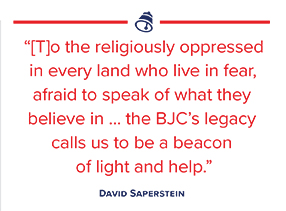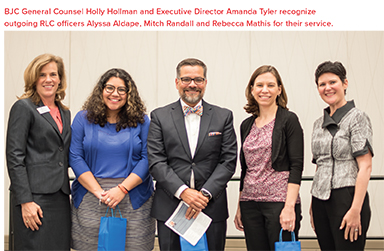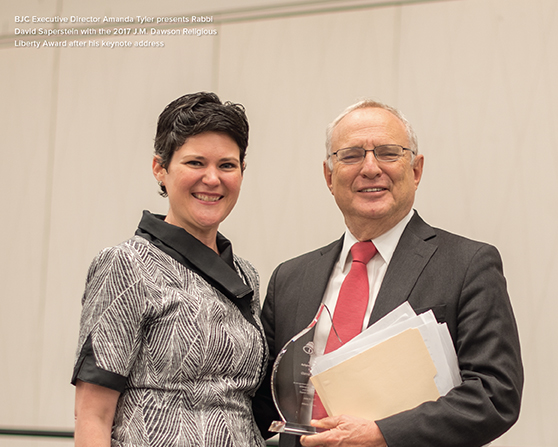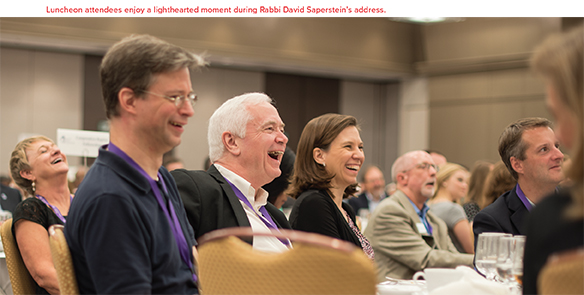 By Cherilyn Crowe
By Cherilyn Crowe
How will you take a stand for religious liberty and speak up for your neighbors? This year’s Religious Liberty Council Luncheon presented new ways to make an impact for religious liberty every day, and Rabbi David Saperstein gave a passionate reminder of the need.
“We’ve learned all too painfully the terrible cost to the universal rights, security and well-being of religious communities when good people remain silent in the face of religious oppression,” said the former U.S. Ambassador-at-Large for International Religious Freedom.
Held June 30 in Atlanta, Georgia, the luncheon gathered religious liberty supporters from across the country. They came together to exchange ideas, make new connections and hear a unifying call to take a stand.
“Our focus is rightly on holding government accountable,” said BJC Executive Director Amanda Tyler. “But, as several recent events have demonstrated, religious freedom also can be jeopardized by acts of individuals.”
Tyler reminded the crowd that recent dramatic surges in hate rhetoric and violence directed at religious minorities are as much threats to religious liberty as any law or public policy.
“And these individual acts require both a response from our officials but also from we the people,” she said. “We as citizens and co-sustainers of our democracy must not abandon the important roles we play in protecting religious liberty.”
The program contained practical ideas for ways to engage your neighbor and break down barriers between people of different backgrounds or religious beliefs (visit BJConline.org/Neighbors).
Saperstein said he was thrilled to see such a focus on protecting religious freedom for all and responding to migrants and refugees around the globe, noting that there are now 63 million refugees worldwide. He said it is the highest number since World War II.
Before serving as the religious freedom ambassador from January 2015 until January 2017, Saperstein spent 40 years leading the Religious Action Center of Reform Judaism. He has worked closely with the Baptist Joint Committee and many other groups, forging coalitions and earning the trust of people across the political spectrum.
He commended the BJC on its immense contributions to religious liberty over the years. “I cannot adequately convey the respect it is accorded on Capitol Hill; the influence, the leadership it has in the broad interfaith and organizational community on behalf of religious freedom,” he said.
Saperstein said that, while the BJC is the voice of reason in the struggle for religious liberty, freedom of conscience and a robust expression of the separation of church and state (that is good for religion and government), some of the key assumptions of those religious liberty foundations are being called into question these days. He led the audience through five key areas that deserve attention.
First, he noted the divisions in our country. Polling shows the way we vote has more to do with issues centering on race and religion than economic factors, and it reveals nearly opposite partisan reactions on the type of culture important for American identity: Democrats tend to say the mixing of cultures and values from around the world, and Republicans tend to say culture grounded in Christian religious values. Polling also shows differing opinions on who faces discrimination in America.
“Finding common ground is going to become more and more challenging,” Saperstein said.
Second, he discussed current fights over the federal Religious Freedom Restoration Act (RFRA). He explained that some say any religious liberty claim to discriminate should be protected, while others say RFRA should never be able to be used to challenge a civil rights law.
“The hardest issues are those that pit valid moral principles against each other,” he said, noting that these clashes threaten to tear our nation apart.
His third focus was on the need for the part of the tax code often called the “Johnson Amendment,” noting how it used to receive broad, non-controversial support. He said there is a lot of misinformation about that prohibition on candidate endorsements by 501(c)(3) organizations, with some people claiming churches will lose their tax-exempt status if they advocate political views. Of course, he said, that’s not the case.
“You can say whatever you want about policy issues, about political issues,” Saperstein reminded the crowd. “If houses of worship become involved in campaigning, they run the risk of extensive government regulation and monitoring of their activities, including their religious activities.”
He also talked about the divisive impact repealing that part of the tax code could have on houses of worship, as they are among the few places where people of diverse cultural and political backgrounds can find a sense of unity. “This is not just bad public policy, it’s bad religious policy as well,” he said.
Saperstein turned his attention for the fourth point to the decision in the Trinity Lutheran Church case, which was released just a few days earlier. He noted that, in the decision, the Court for the first time allowed direct cash funding of a pervasively religious institution. He said the arguments for the funding centered around the desire to be treated like everyone else, but that can apply to other areas of religious life and could threaten special exemptions religious groups have. “There are many strings attached to government money,” he reminded the crowd.
His final comments focused on the international scene, which he monitored closely as the country’s religious freedom ambassador. He lamented the state of so many communities struggling for religious freedom, such as the Christians and Yazidis in Iraq and Syria, Baha’is in Iran, Tibetan Buddhists in China, and Shia Muslims in Saudia Arabia, Pakistan and Bahrain.
“So, to the religiously oppressed in every land who live in fear, afraid to speak of what they believe in; who worship in underground churches, mosques or temples, lest the authorities discover and punish their devotion to an authority beyond the state; who languish in prisons, bodies broken, spirits too often disfigured simply because they love God and worship in their own way or question the existence of God; who feel so desperate that they flee their homes to avoid being killed and persecuted because of their faith; for all of them, the BJC’s legacy calls us to be a beacon of light and help,” he said, calling the crowd to use their voices and not be silent.
“And every time that you speak out and every time you act effectively, you not only affirm God’s vision of giving humanity those fundamental freedoms that are our inalienable rights, but you help make a better world for your children and all God’s children. May that be the blessing of this gathering, may it be the blessing of your work, and may it be the blessing of your lives,” he concluded.
Following his address, Saperstein received the BJC’s highest honor: the J.M. Dawson Religious Liberty Award. Tyler made the presentation, commending Saperstein’s stalwart defense of religious liberty throughout his career that continues today.
As the individual donor organization of the Baptist Joint Committee, the Religious Liberty Council is one of the 15 supporting bodies of the BJC. All BJC donors are members of the RLC, and the luncheon included the election of new RLC officers and RLC representatives to the board.
The new co-chairs are Alyssa Aldape of Washington, D.C., and Tambi Swiney of Nashville, Tennessee. Ashton Wells of Kansas City, Missouri, was elected secretary.
 Those rotating off RLC leadership positions were also honored at the luncheon. Outgoing RLC Co-chairs Mitch Randall and Rebecca Mathis were recognized alongside Aldape, who moves out of her role as secretary with her new position.
Those rotating off RLC leadership positions were also honored at the luncheon. Outgoing RLC Co-chairs Mitch Randall and Rebecca Mathis were recognized alongside Aldape, who moves out of her role as secretary with her new position.
The crowd re-elected Charles Cates of Virginia and Jenny Smith of Alabama for their second three-year terms representing the RLC on the BJC board. Daniel Glaze of Virginia and Mathis of North Carolina were elected to new terms to represent the RLC.
BJC General Counsel Holly Hollman and Tyler also recognized two long-serving board members who are rotating out of representation: Pam Durso, who has served as a representative of the Cooperative Baptist Fellowship on the BJC board, and Jim Hill, who represented Churchnet. Hill is retiring this year after leading the Missouri-based organization since 2004.
The annual Religious Liberty Council Luncheon is held in conjunction with the Cooperative Baptist Fellowship General Assembly. Next year’s event will be in Dallas, Texas.
For more on the 2017 luncheon, including a video of the entire program, visit BJConline.org/Luncheon.
From the July/August 2017 edition of Report from the Capital. You can also read the digital version of the magazine or view it as a PDF.




